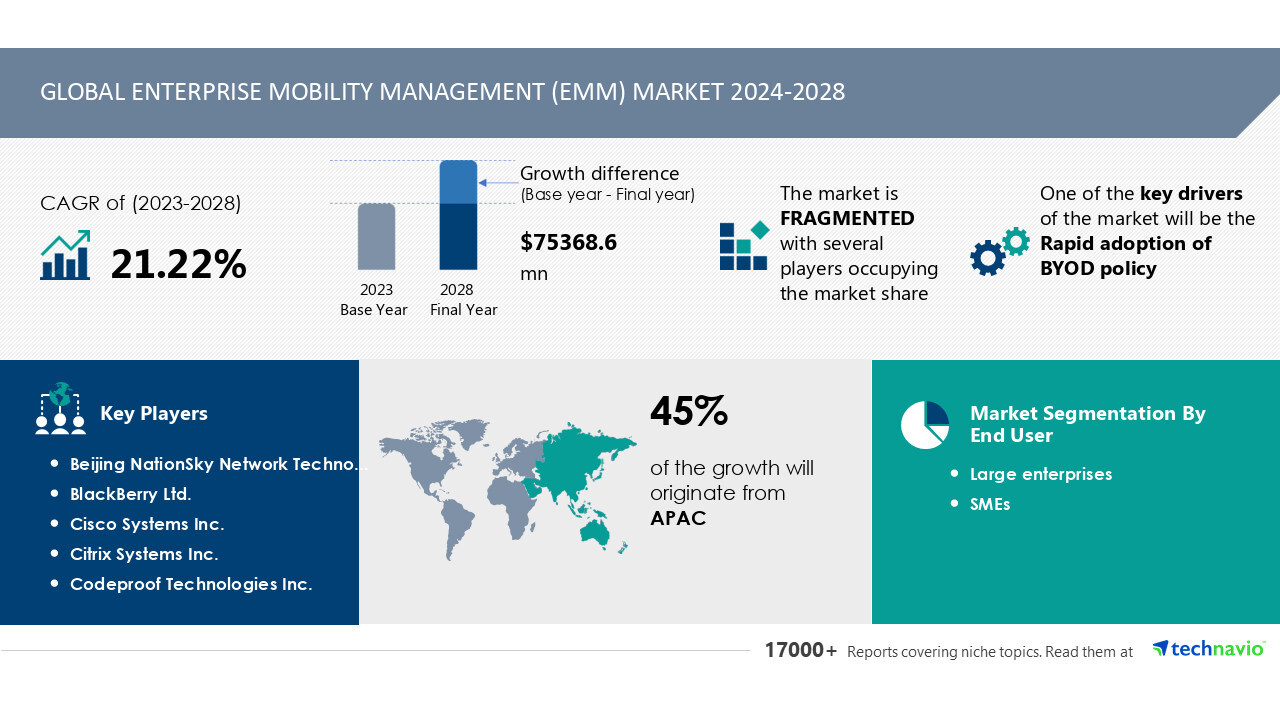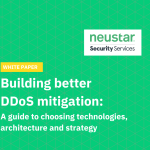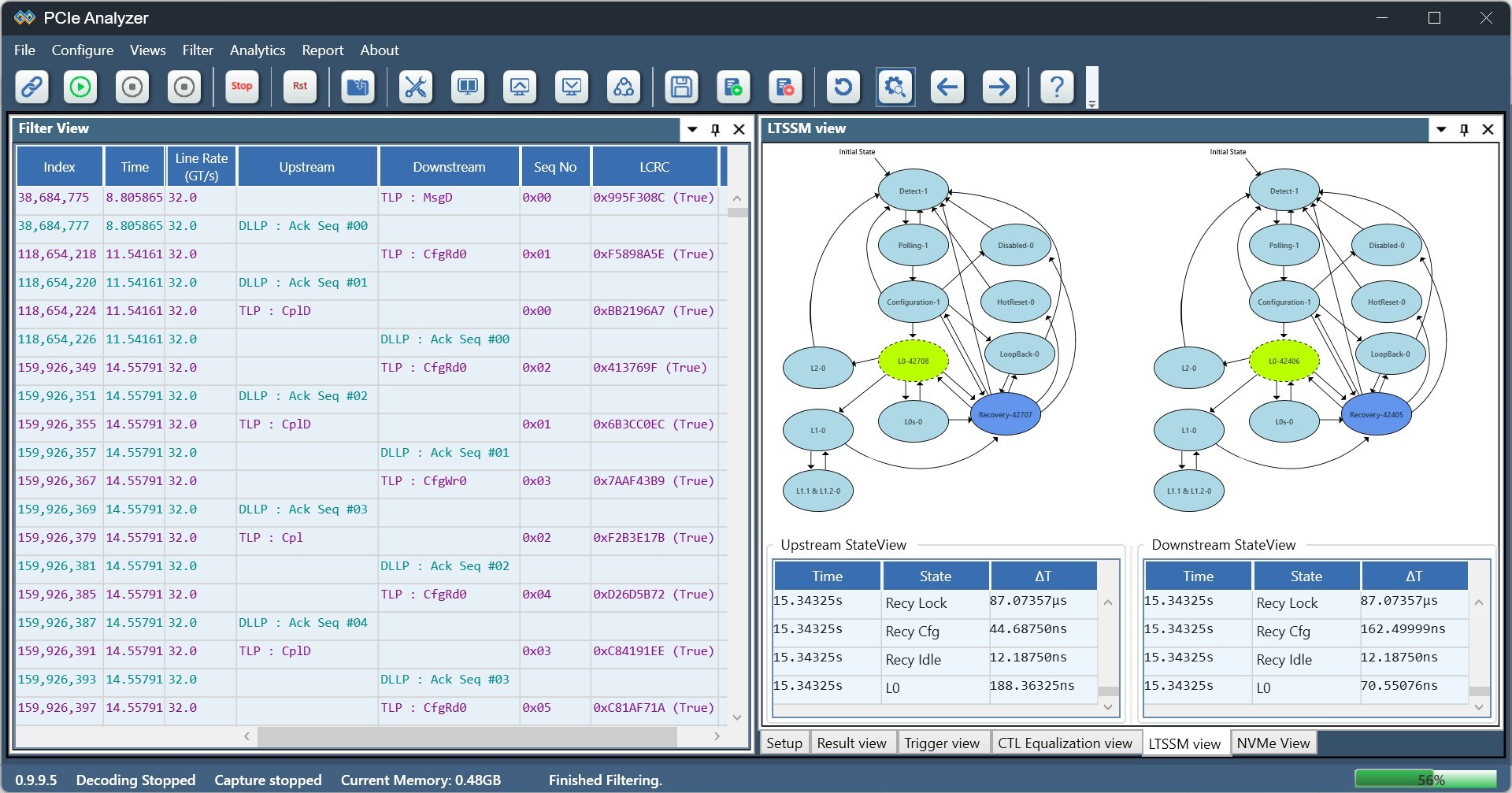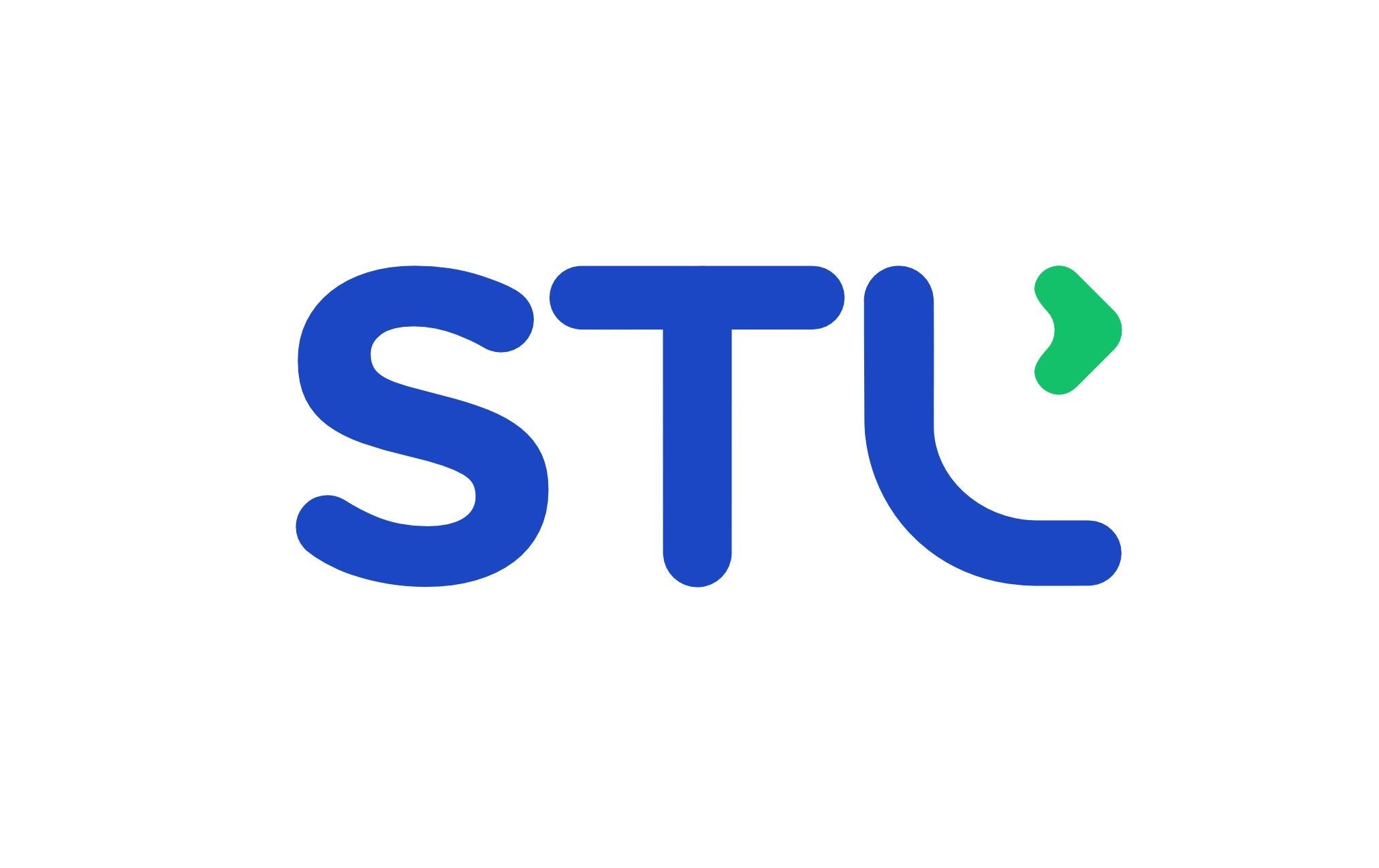NEW YORK, Dec. 5, 2024 -- Report on how AI is redefining market landscape - The global enterprise mobility management (EMM) market size is estimated to grow by USD 75.37 billion from 2024-2028, according to Technavio. The market is estimated to grow at a CAGR of 21.22% during the forecast period. Rapid adoption of byod policy is driving market growth, with a trend towards increasing adoption of EMM solutions in BFSI sector. However, privacy and compliance associated with emm poses a challenge. Key market players include Beijing NationSky Network Technology Co. Ltd., BlackBerry Ltd., Cisco Systems Inc., Citrix Systems Inc., Codeproof Technologies Inc., GoTo, International Business Machines Corp., Ivanti Software Inc., Matrix42 GmbH, Microsoft Corp., Mitsogo Inc., ProMobi Technologies Pvt. Ltd., Quest Software Inc., SAP SE, SIA CYONE, Snow Software, Sophos Ltd., SOTI Inc., VMware Inc., and Zoho Corp. Pvt. Ltd..
Key insights into market evolution with AI-powered analysis. Explore trends, segmentation, and growth drivers- View Free Sample PDF
Enterprise Mobility Management (Emm) Market Scope | |
Report Coverage | Details |
Base year | 2023 |
Historic period | 2017 - 2021 |
Forecast period | 2024-2028 |
Growth momentum & CAGR | Accelerate at a CAGR of 21.22% |
Market growth 2024-2028 | USD 75368.6 million |
Market structure | Fragmented |
YoY growth 2022-2023 (%) | 18.16 |
Regional analysis | APAC, Europe, North America, South America, and Middle East and Africa |
Performing market contribution | APAC at 45% |
Key countries | China, US, Germany, UK, and Japan |
Key companies profiled | Beijing NationSky Network Technology Co. Ltd., BlackBerry Ltd., Cisco Systems Inc., Citrix Systems Inc., Codeproof Technologies Inc., GoTo, International Business Machines Corp., Ivanti Software Inc., Matrix42 GmbH, Microsoft Corp., Mitsogo Inc., ProMobi Technologies Pvt. Ltd., Quest Software Inc., SAP SE, SIA CYONE, Snow Software, Sophos Ltd., SOTI Inc., VMware Inc., and Zoho Corp. Pvt. Ltd. |
Market Driver
Enterprise mobility is a growing trend in business, enabling employees to work remotely using mobile devices such as laptops and tablets. Cloud-based Enterprise Mobility Management (EMM) solutions, including Mobile Device Management (MDM), Mobile Application Management (MAM), Mobile Content Management (MCM), and Mobile Security Management (MSM), are popular choices for IT administrators. These solutions provide security features like data wiping, encryption, and cybersecurity solutions to protect sensitive information from cyberattacks. Cloud-based EMM is a flexible and scalable option, offering affordability and operational efficiency. Market leaders like TRUCE Software, 3Eye Technologies, and TD SYNNEX are driving innovation in this space. Mobile security protocols, multifactor authentication, and AI-powered authentication are essential components of EMM. Large enterprises prioritize mobility for their mobile workforce, implementing BYOD programs and workflow automation. However, remote work practices introduce vulnerabilities, making security a top priority. EMM solutions manage corporate devices, ensuring business continuity and productivity. Cybersecurity professionals and developers focus on data encryption, digital signature, and cryptographic hash to protect critical data. Verticals like healthcare, life sciences, and supply chain management require security infrastructure to safeguard sensitive information. As the market evolves, research projects at universities like Université de Sherbrooke explore new technologies like 5G connectivity and VPN solutions to enhance enterprise mobility. Dealers and distributors play a crucial role in brand identity and customer acquisitions, while business clients prioritize customer experience and profitability. In summary, EMM solutions provide essential management controls and security protocols for enterprise mobility, enabling a flexible and productive remote workforce while ensuring business continuity and data security.
In the BFSI sector, the shift towards digital services has led to an increased need for secure management of critical financial information. With the adoption of the Zero Trust model for cybersecurity, financial institutions are enhancing their security posture. EMM solutions have become essential for BFSI organizations to ensure the secure handling of sensitive data, particularly in the context of remote work and Bring Your Own Device (BYOD) policies. Compliance with security regulations is another key driver for the implementation of EMM solutions in the BFSI sector. By utilizing EMM tools, financial institutions can effectively manage and secure their mobile devices, applications, and data, safeguarding their business and maintaining customer trust.
Request Sample of our comprehensive report now to stay ahead in the AI-driven market evolution!
• Enterprise mobility management (EMM) is essential for businesses to securely manage their mobile devices, laptops, and connected devices in today's remote work environment. Challenges include cloud-based EMM, Mobile Device Management (MDM), mobile device provisioning, Mobile Application Management (MAM), mobile security, and Mobile Content Management (MCM). IT administrators must ensure data wiping, encryption, and cybersecurity solutions protect sensitive information from cyberattacks. Cloud-based EMM, MDM, and MAM solutions offer flexibility for a mobile workforce, enabling BYOD programs and workforce productivity. However, they also present vulnerabilities and require security protocols, including multifactor authentication and AI-powered authentication. Market leaders like TRUCE Software, 3Eye Technologies, and TD SYNNEX provide enterprise systems and security solutions to manage corporate devices and ensure business continuity. As the workforce becomes more remote, managing corporate resources securely is crucial. Large enterprises face unique challenges, such as managing a remote security infrastructure, ensuring data management, and maintaining brand identity. Verticals like healthcare, life sciences, and supply chain management require specialized solutions, including 5G connectivity and healthcare machines. Cybersecurity professionals, developers, and IT teams must navigate the decision-making process to implement effective EMM solutions, considering components like cloud deployment, flexibility, scalability, affordability, and operational efficiency. Ultimately, EMM is essential for managing critical data, workflows, and mobile security protocols to protect against cyberattacks and maintain profitability.
• In the global Enterprise Mobility Management (EMM) market, privacy and compliance are paramount. Organizations implementing EMM solutions to manage and secure their mobile ecosystems must handle sensitive information, including employee data, device information, and corporate data accessed through mobile devices. This data raises privacy concerns, as organizations must safeguard personal information and adhere to legal obligations. Jurisdictions like the European Union and California have data protection regulations such as GDPR and CCPA, while industries like healthcare are subject to sector-specific regulations like HIPAA. Navigating these privacy regulations and compliance requirements is essential for organizations to protect their data and maintain trust with their employees and customers.
Discover how AI is revolutionizing market trends- Get your access now!
This enterprise mobility management (emm) market report extensively covers market segmentation by
- End-user
- 1.1 Large enterprises
- 1.2 SMEs
- Deployment
- 2.1 On premise
- 2.2 Cloud based
- Geography
- 3.1 APAC
- 3.2 Europe
- 3.3 North America
- 3.4 South America
- 3.5 Middle East and Africa
1.1 Large enterprises- Large enterprises, also known as corporations or big businesses, require unique solutions for Enterprise Mobility Management (EMM) due to their size and complexity. Scalability is a significant factor, as these organizations often manage a large fleet of mobile devices, including smartphones, tablets, and laptops. EMM solutions must handle a high volume of devices efficiently, ensuring seamless integration with existing IT infrastructure such as ERP and CRM systems. Advanced security features, including data encryption, secure network communication, device authentication, and secure containerization, are essential for large enterprises due to their vast amount of sensitive data and intellectual property. The growing adoption of EMM solutions in large enterprises, with their ability to manage, monitor, and secure a large number of devices while integrating with existing IT systems and providing advanced security features, will drive the growth of the global EMM market in the large enterprises segment.
Download a Sample of our comprehensive report today to discover how AI-driven innovations are reshaping competitive dynamics
Enterprise mobility management (EMM) refers to the use of technologies and practices to manage mobile devices, such as smartphones and laptops, in a business environment. Cloud-based EMM solutions enable IT administrators to manage and secure connected mobile devices from a centralized platform. Mobile device management (MDM) is a key component of EMM, allowing for mobile device provisioning, data wiping, and encryption. Mobile application management (MAM) is another aspect, focusing on securing and managing mobile applications that access sensitive information. With the increasing use of mobile devices in the enterprise, cybersecurity solutions are crucial to protect against potential security breaches and data loss. Research projects at institutions like Université de Sherbrooke explore the latest developments in EMM, including 5G connectivity and workflow automation. TD SYNNEX, a leading IT distributor, offers a range of enterprise systems and security solutions to help businesses implement effective EMM strategies. The flexible nature of EMM is particularly important for the mobile workforce and BYOD programs, enabling secure access to critical data and ensuring a security infrastructure.
Enterprise mobility management (EMM) refers to the use of technologies and practices to manage mobile devices, laptops, and connected mobile devices in a business context. This includes cloud-based EMM solutions such as Mobile Device Management (MDM), Mobile Application Management (MAM), Mobile Content Management (MCM), and Mobile Identity and Access Management (IAM). EMM enables IT administrators to ensure mobile security, manage mobile devices, and maintain business continuity for a flexible and productive mobile workforce. Key features of EMM include data wiping, encryption, cybersecurity solutions, and mobile security protocols. With the increasing use of 5G connectivity and the rise of cyberattacks, EMM is becoming essential for managing the security of sensitive information and corporate resources. EMM solutions can be deployed in various ways, including cloud deployment, which offers flexibility, scalability, and affordability. The market for EMM is growing rapidly, driven by the increasing use of mobile devices in the enterprise, the need for remote work practices, and the importance of managing critical data and business continuity. EMM solutions cater to various industries, including healthcare, life sciences, and supply chain management, and offer features like workflow automation, VPN solutions, and multifactor authentication. EMM solutions help IT teams make informed decisions, manage data, and ensure business clients have a positive customer experience. Market leaders in EMM include TRUCE Software, 3Eye Technologies, and TD SYNNEX, among others. EMM solutions offer various components, including security systems, mobile device provisioning, and mobile security protocols. The focus on cybersecurity is crucial, as vulnerabilities in mobile devices and applications can lead to significant data breaches and loss of critical information. EMM solutions also offer remote wiping capabilities, ensuring that sensitive data is protected even if a device is lost or stolen. In conclusion, EMM is a crucial aspect of managing a modern enterprise, enabling businesses to manage mobile devices, ensure security, and maintain productivity. With the increasing use of mobile devices and the need for remote work practices, EMM solutions are becoming essential for businesses of all sizes, from small businesses to large enterprises. The future of EMM lies in AI-powered authentication, remote security, and the integration of 5G connectivity and IoT devices.
1 Executive Summary
2 Market Landscape
3 Market Sizing
4 Historic Market Size
5 Five Forces Analysis
6 Market Segmentation
- End-user
- Large Enterprises
- SMEs
- Deployment
- On Premise
- Cloud Based
- Geography
- APAC
- Europe
- North America
- South America
- Middle East And Africa
7 Customer Landscape
8 Geographic Landscape
9 Drivers, Challenges, and Trends
10 Company Landscape
11 Company Analysis
12 Appendix
Technavio is a leading global technology research and advisory company. Their research and analysis focuses on emerging market trends and provides actionable insights to help businesses identify market opportunities and develop effective strategies to optimize their market positions.
With over 500 specialized analysts, Technavio's report library consists of more than 17,000 reports and counting, covering 800 technologies, spanning across 50 countries. Their client base consists of enterprises of all sizes, including more than 100 Fortune 500 companies. This growing client base relies on Technavio's comprehensive coverage, extensive research, and actionable market insights to identify opportunities in existing and potential markets and assess their competitive positions within changing market scenarios.
Technavio Research
Jesse Maida
Media & Marketing Executive
US: +1 844 364 1100
UK: +44 203 893 3200
Email: media@technavio.com
Website: www.technavio.com/
This News is brought to you by Qube Mark, your trusted source for the latest updates and insights in marketing technology. Stay tuned for more groundbreaking innovations in the world of technology.









